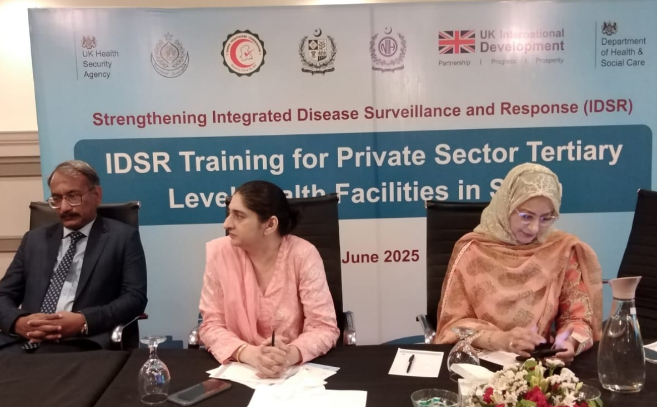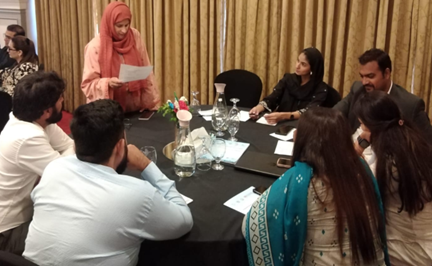
The Integrated Disease Surveillance and Response (IDSR) system has made remarkable progress in Sindh, becoming the first province in Pakistan where all district public sector primary and secondary care hospitals and a significant number of public sector tertiary care hospitals have been trained – totaling over 2,100 facilities. This achievement is the result of strong provincial leadership, the support of the National Institute of Health (NIH), and technical assistance from the UK Health Security Agency (UKHSA) International Health Regulations Strengthening Project (IHR-SP).
Following the successful completion of IDSR Phase-1, a five-year roadmap has been developed to extend the system into both public and private tertiary care. With an estimated 65–70% of the population seeking healthcare from private providers, these hospitals represent substantial source of population data that has been systematically underutilised for early detection and timely response to infectious disease threats. Sindh province has over 60 private hospitals that remain outside the Integrated Disease Surveillance and Response (IDSR) network. Bringing these facilities into the system would significantly strengthen Pakistan's disease surveillance and response capabilities, helping the country meet its obligations under the International Health Regulations (2005).
First IDSR Training for Private Hospitals in Karachi
In collaboration with the Sindh Healthcare Commission (SHCC), the Department of Health Sindh, and NIH, UKHSA IHR-SP facilitated the first-ever IDSR training for private tertiary hospitals in Karachi from 3–5 June 2025.
The training brought together clinicians, health information officers, and administrators from 11 leading private hospitals. The primary objective was to enable daily reporting of both suspected and confirmed cases of 35 priority diseases through the District Health Information System (DHIS-2) from the participating hospitals.
Core modules included:
- International Health Regulations (IHR) and IDSR fundamentals
- Public health surveillance and outbreak investigation
- Priority diseases and case definitions
- Disease reporting via DHIS2, alert generation and verification
- Risk communication strategies
To enhance practical learning, the training incorporated clinical case scenarios and hands-on DHIS2 sessions, ensuring participants could apply their knowledge in real-world settings.
Image: partner representatives from Sindh (left) and group exercises taking place (right)
Outcomes and Way Forward
The training was met with high levels of engagement, and several institutions expressed readiness to institutionalise IDSR-aligned surveillance practices. To sustain this momentum, further technical support and follow-up will monitor implementation and expand the initiative to other facilities.
The successful integration of a portion of private hospitals into Sindh’s IDSR system demonstrates the power of public-private collaboration, a growing awareness of IDSR’s value and a collective commitment to health security. Scaling this model to additional private hospitals across Sindh, other districts and sectors will be essential in building a resilient, inclusive, and responsive surveillance system across the province.
Also By
- First-of-its-kind Community-Based Surveillance Training in Mardan to Boost Pakistan’s Disease Preparedness and response
- Emergency disease surveillance system in action for recurrent floods in Pakistan
- Expanding Sindh’s Integrated Disease Surveillance and Response Network (IDSR) Laboratory Network to private laboratories
Useful Resources
Related Articles
-
Pioneering training on “District Health Information System-2” to strengthen Integrated Disease Surveillance and Response System in laboratories in Sindh province of Pakistan
BY IHR -
Punjab takes critical step in IDSR laboratory network development
BY Dr Muhammad Sartaj, Maimoona Junaid, Dr. Muhammad Saeed Akhtar -
From vision to action: Sindh’s IDSR Lab Network Review marks key progress in Pakistan’s IDSR journey
BY Dr Muhammad Sartaj -
Gilgit-Baltistan launches new laboratory network in efforts to strengthen Integrated Disease Surveillance and Response across Pakistan
BY Dr Muhammad Sartaj, Sumera Abid -
Establishing Integrated Disease Surveillance and Response System (IDSR) Laboratory Network in Gilgit Baltistan, 1 August 2024
BY IHR



Please Sign in (or Register) to view further.